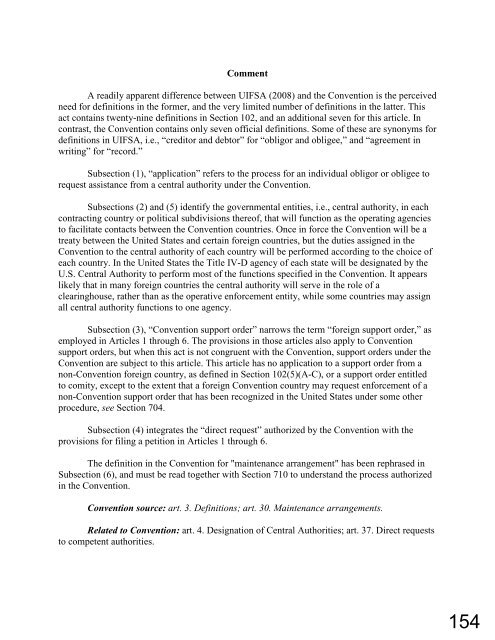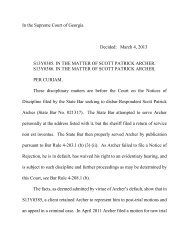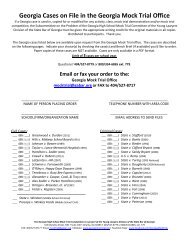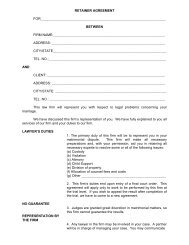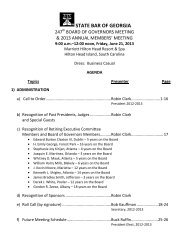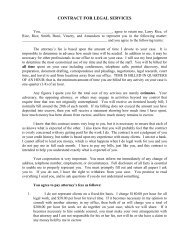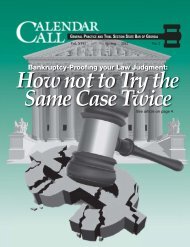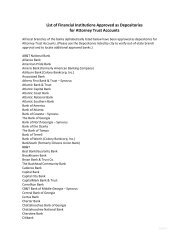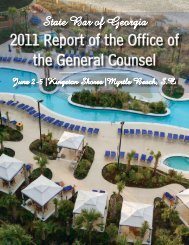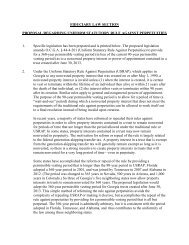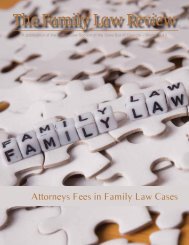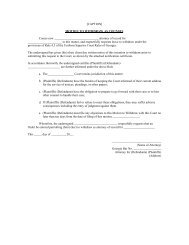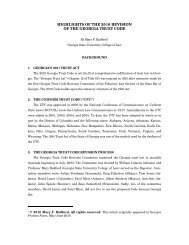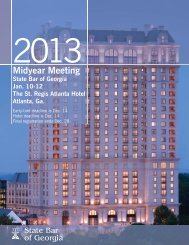2008 Amendments to the Uniform Interstate Family Support Act ...
2008 Amendments to the Uniform Interstate Family Support Act ...
2008 Amendments to the Uniform Interstate Family Support Act ...
You also want an ePaper? Increase the reach of your titles
YUMPU automatically turns print PDFs into web optimized ePapers that Google loves.
Comment<br />
A readily apparent difference between UIFSA (<strong>2008</strong>) and <strong>the</strong> Convention is <strong>the</strong> perceived<br />
need for definitions in <strong>the</strong> former, and <strong>the</strong> very limited number of definitions in <strong>the</strong> latter. This<br />
act contains twenty-nine definitions in Section 102, and an additional seven for this article. In<br />
contrast, <strong>the</strong> Convention contains only seven official definitions. Some of <strong>the</strong>se are synonyms for<br />
definitions in UIFSA, i.e., “credi<strong>to</strong>r and deb<strong>to</strong>r” for “obligor and obligee,” and “agreement in<br />
writing” for “record.”<br />
Subsection (1), “application” refers <strong>to</strong> <strong>the</strong> process for an individual obligor or obligee <strong>to</strong><br />
request assistance from a central authority under <strong>the</strong> Convention.<br />
Subsections (2) and (5) identify <strong>the</strong> governmental entities, i.e., central authority, in each<br />
contracting country or political subdivisions <strong>the</strong>reof, that will function as <strong>the</strong> operating agencies<br />
<strong>to</strong> facilitate contacts between <strong>the</strong> Convention countries. Once in force <strong>the</strong> Convention will be a<br />
treaty between <strong>the</strong> United States and certain foreign countries, but <strong>the</strong> duties assigned in <strong>the</strong><br />
Convention <strong>to</strong> <strong>the</strong> central authority of each country will be performed according <strong>to</strong> <strong>the</strong> choice of<br />
each country. In <strong>the</strong> United States <strong>the</strong> Title IV-D agency of each state will be designated by <strong>the</strong><br />
U.S. Central Authority <strong>to</strong> perform most of <strong>the</strong> functions specified in <strong>the</strong> Convention. It appears<br />
likely that in many foreign countries <strong>the</strong> central authority will serve in <strong>the</strong> role of a<br />
clearinghouse, ra<strong>the</strong>r than as <strong>the</strong> operative enforcement entity, while some countries may assign<br />
all central authority functions <strong>to</strong> one agency.<br />
Subsection (3), “Convention support order” narrows <strong>the</strong> term “foreign support order,” as<br />
employed in Articles 1 through 6. The provisions in those articles also apply <strong>to</strong> Convention<br />
support orders, but when this act is not congruent with <strong>the</strong> Convention, support orders under <strong>the</strong><br />
Convention are subject <strong>to</strong> this article. This article has no application <strong>to</strong> a support order from a<br />
non-Convention foreign country, as defined in Section 102(5)(A-C), or a support order entitled<br />
<strong>to</strong> comity, except <strong>to</strong> <strong>the</strong> extent that a foreign Convention country may request enforcement of a<br />
non-Convention support order that has been recognized in <strong>the</strong> United States under some o<strong>the</strong>r<br />
procedure, see Section 704.<br />
Subsection (4) integrates <strong>the</strong> “direct request” authorized by <strong>the</strong> Convention with <strong>the</strong><br />
provisions for filing a petition in Articles 1 through 6.<br />
The definition in <strong>the</strong> Convention for "maintenance arrangement" has been rephrased in<br />
Subsection (6), and must be read <strong>to</strong>ge<strong>the</strong>r with Section 710 <strong>to</strong> understand <strong>the</strong> process authorized<br />
in <strong>the</strong> Convention.<br />
Convention source: art. 3. Definitions; art. 30. Maintenance arrangements.<br />
Related <strong>to</strong> Convention: art. 4. Designation of Central Authorities; art. 37. Direct requests<br />
<strong>to</strong> competent authorities.<br />
154


